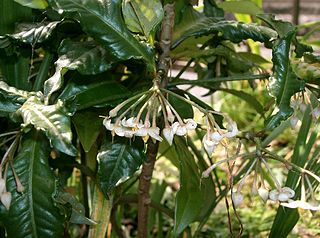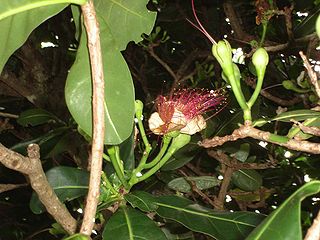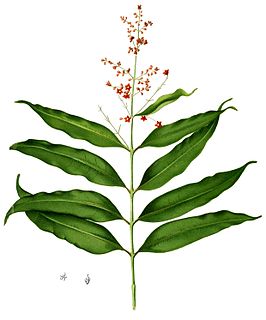
Calocedrus, the incense cedar, is a genus of coniferous trees in the cypress family Cupressaceae first described as a genus in 1873. It is native to eastern Asia and western North America. The generic name Calocedrus means "beautiful cedar".

Gigantochloa is a tropical Asian and Papuasian genus of giant clumping bamboos in the grass family. It is found in southern China, Southeast Asia, the Indian subcontinent, and New Guinea.

Hemigraphis is a genus of plants in the family Acanthaceae, consisting of nearly 40 species native to tropical Asia. Hemigraphis is similar to plants the genus Strobilanthes, with some species now placed there. Its its native range is Nansei-shoto and from Indo-China to New Guinea.

Ardisia is a genus of flowering plants in the family Primulaceae. It was in the former Myrsinaceae family now recognised as the myrsine sub-family Myrsinoideae. They are distributed in the Americas, Asia, Australia, and the Pacific Islands, mainly in the tropics. There are over 700 accepted species. One species, Ardisia japonica is one of the 50 fundamental herbs in traditional Chinese medicine.

Barringtonia is a genus of flowering plants in the family Lecythidaceae first described as a genus with this name in 1775. It is native to Africa, southern Asia, Australia, and various islands of the Pacific and Indian Oceans. The genus name commemorates Daines Barrington.

Hopea is a genus of plants in the family Dipterocarpaceae. The genus was named after John Hope, 1725–1786, the first Regius Keeper of the Royal Botanic Garden, Edinburgh. It contains some 113 species, distributed from Sri Lanka and southern India to southern China, and southward throughout Malesia to New Guinea. They are mainly main and subcanopy trees of lowland rainforest, but some species can become also emergent trees, such as Hopea nutans.

Barringtonia asiatica is a species of Barringtonia native to mangrove habitats from islands of the Indian Ocean in the west to tropical Asia and islands of the western Pacific Ocean. It is grown along streets for decorative and shade purposes in some parts of India, for instance in some towns on the southeastern shore. It is also known as Box Fruit due to the distinct box-shaped fruit it produces. The local name futu is the source of the name for the Polynesian island Futuna. The type specimen was collected by botanist Pehr Osbeck on a sandy beach area on the island of Java, later to be described by Carl Linnaeus in his Species Plantarum in 1753.

Molineria is a genus of flowering plants. In the APG III classification system, it is placed in the family Hypoxidaceae. It is native to Southeast Asia, China, the Indian Subcontinent, Papuasia, and Queensland.
- Molineria capitulata(Lour.) Herb. - China, Indian Subcontinent, Southeast Asia, Papuasia, Queensland; naturalized in Mexico, Central America, West Indies, Argentina, Mauritius, Réunion
- Molineria crassifoliaBaker - Nepal, Assam, Bhutan, Sikkim, Yunnan, Arunachal Pradesh
- Molineria gracilisKurz - southern China, Assam, Bhutan, Nepal, Cambodia, Thailand, Vietnam
- Molineria latifolia(Dryand. ex W.T.Aiton) Herb. ex Kurz - China, Bangladesh, Indochina, Philippines, western Indonesia
- Molineria oliganthaC.E.C.Fisch. - Assam
- Molineria prainianaDeb - Assam, Bhutan
- Molineria trichocarpa(Wight) N.P.Balakr. - southern India, Sri Lanka

Cratoxylum sumatranum is a species of flowering plant in the Hypericaceae family. It is indigenous to Southeast Asia, including Burma, Indochina, Thailand, Malaysia, Sumatra, Java, Lesser Sunda Islands, Borneo, Philippines and Sulawesi.

Holigarna is a genus of trees in the subfamily Anacardioideae of the cashew and sumac family Anacardiaceae. They grow naturally in India, Bangladesh and Indo-China. This is a poisonous tree if contacted it would irritate skin chemically and result in irreversible skin damage. Smoke from burning this wood is dangerously disabling.

Phlogacanthus is a genus of flowering plants in the family Acanthaceae and tribe Andrographideae. Its distribution includes India through to Indo-China, southern China and Sulawesi.

Jasminum laurifolium, the angel-wing jasmine, is a species of flowering plant in the genus Jasminum, native to the Himalayas, Nepal, Assam, Bangladesh, Tibet, south-central and southeast China, Hainan, Myanmar, and Thailand. Its putative form Jasminum laurifolium f. nitidum has gained the Royal Horticultural Society's Award of Garden Merit.
Tridynamia is a genus of flowering plants belonging to the family Convolvulaceae.
Allospondias is a genus of flowering plants belonging to the family Anacardiaceae.
Cracosna is a genus of flowering plants belonging to the family Gentianaceae.
Henslowia is a genus of flowering plants belonging to the family Santalaceae.
Duplipetala is a genus of flowering plants belonging to the family Gentianaceae.
Hullettia is a genus of flowering plants belonging to the family Moraceae.
Morindopsis is a genus of flowering plants belonging to the family Rubiaceae.
Natsiatopsis is a monotypic genus of flowering plants belonging to the family Icacinaceae. The only species is Natsiatopsis thunbergiifolia.











